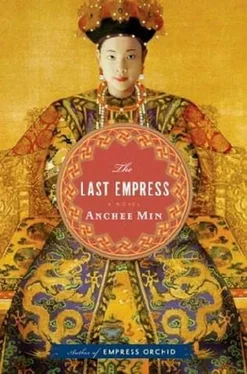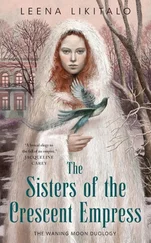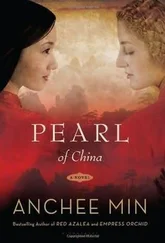In my reply I wrote: "As coregents, all Nuharoo and I desire to see is order and peace, and this goal simply cannot be achieved without your being in charge. Until you accept the promotion, we won't be able to rest our conscience."
Tseng Kuo-fan reluctantly complied.
As the senior governor in charge of the provinces of Jiangsu, Jiang-hsi, and Anhwei, Tseng Kuo-fan became the first Han Chinese whose rank was equal to that of Yung Lu and Prince Kung.
Tseng worked tirelessly yet continued to be what others would describe as overcautious. He kept his distance from the throne. His suspicion was a classic one. In countless instances over China's long history, even as a powerful general was honored, plans were made for his murder. This was especially so when the ruler feared that the general had surpassed him in power.
Tung Chih was becoming susceptible to his uncle Prince Kung's negative attitude toward the Han. I begged them both to see things differently and to help me regain the trust of Tseng Kuo-fan. My thinking was that if Tseng were to provide stability, my son would be the one to benefit.
In Tung Chih's name I let Tseng Kuo-fan know that I would protect him. When Tseng revealed his doubts, I tried to reassure him-I promised that I wouldn't retire until my son showed sufficient maturity to assume the throne.
I convinced Tseng that it would be safe for him to act as he saw fit. With my encouragement, the general began to plan battles broader and more ambitious in scope. Gathering his forces from the north, he moved steadily south until he established headquarters near Anking, a strategically important city in Anhwei. Tseng Kuo-fan then ordered his brother, Tseng Kuo-quan, to station his army outside the Taiping capital at Nanking.
An-te-hai created a map to help me visualize Tseng's movements. The map looked like a fine painting. An-te-hai put little colored flags over its surface. I saw Tseng dispatch the Manchu general Chou Tsung-tang to the south to encircle the city of Hangchow, in Chekiang province. General Peng Yu-lin was assigned to block the Yangtze River shoreline. Li Hung-chang, Tseng Kuo-fan's most trusted man, was given the job of blocking the enemy's escape route near Soochow.
The flags on the map changed daily. Before New Year's Day of 1869, Tseng launched a grand attack, wrapping up the Taipings like a spring roll. To further secure his position, he pulled in forces from north of the Yangtze. For the final enclosure, he worked with Yung Lu, whose soldiers came from behind to cut the Taipings' supply line.
"The encirclement is as tight as a sealed bag," An-te-hai said, sticking out his chest and striking a Tseng-like pose. "Nanking is crumbling!"
I moved the little flags around like chess pieces on a board. It became a pleasure. By Tseng Kuo-fan's moves, I could trace how his mind worked and thrilled at his brilliance.
For days I sat by the map, ate my meals there and kept up with all the battle news. From a recent report I learned that the Taipings had pulled out their last forces from Hangchow. Strategically, this was a fatal mistake. Li Hung-chang soon rounded up the remnants of the army at Soochow. Li's counterpart General Chou Tsung-tang moved in and took Hangchow. The rebels lost their base. With all the Imperial forces in place, Tseng Kuo-fan charged.
Tung Chih cheered and Nuharoo and I wept when the report of the final victory reached the Forbidden City. We climbed into our palanquins and went to the Heavenly Altar to comfort Hsien Feng's spirit.
Once again in Tung Chih's name I issued a decree honoring Tseng Kuo-fan and his fellow generals. A few days later I received a detailed report from Tseng confirming the victory. Then Yung Lu returned to the capital. In our usual quiet manner we shared our excitement. As my ladies in waiting and An-te-hai looked on, Yung Lu informed me of his own role in the battles and praised General Tseng's leadership. Expressing concern, he told me that Tseng had recently lost most of his sight following a serious eye infection. Delays in treatment had worsened the condition.
I summoned Tseng Kuo-fan for a private audience as soon as he had returned to Peking.
In his flowing silk robe and peacock tail hat the Chinese general threw himself at my feet. His forehead remained down to express his gratitude. As he waited for me to utter "rise," I myself rose and bowed in his direction. I ignored etiquette; it seemed the proper thing to do.
"Let me take a good look at you, Tseng Kuo-fan," I said with tears in my eyes. "I am so glad you returned safely."
He rose and went to sit on the chair An-te-hai provided.
I was surprised to see that he was no longer the vital man I remembered from only a few years before. His magnificent robe could not hide his frailty. His skin was leather dry and his bushy eyebrows looked like snowballs. He was about sixty years old, but a slight hunch in his back made him look a decade older.
After tea was served I suggested that he follow me to the drawing room, where he could sit more comfortably. He wouldn't move until I told him that I was tired of sitting on a chair whose deeply carved wood hurt my back. I smiled and said that the ornate furniture in the audience hall was good only for show.
"You see, Tseng Kuo-fan, I can barely hear you." I pointed at the distance between us. "It is not easy for either of us. On the one hand, it is considered rude if you raise your voice. On the other hand, I can't bear to not hear you."
Tseng nodded and moved to sit near me, on my lower left. He did not know that I had fought for this meeting. The Manchu clansmen and Prince Kung had ignored my request to honor Tseng with the private audience. I pleaded that if it hadn't been for Tseng Kuo-fan, the Manchu Dynasty would have come to an end.
Nuharoo had refused to take my side when I went to her for support. Like the rest, she took Tseng Kuo-fan for granted. Eventually I persuaded her to back the invitation, but a few hours before the meeting was to take place, she again changed her mind.
I was beside myself with anger.
Nuharoo yielded, but sighed and said, "If only you had one drop of royal blood in you."
True, I had not a drop. But that was precisely what drew me to Tseng Kuo-fan. By treating him with respect, I was respecting myself.
My negotiations with the Imperial clan had ended in compromise: I was to meet Tseng for fifteen minutes.
"I heard that you have lost your sight. Is that true?" I asked while watching the clock ticking on the wall. "May I know which eye is bad?"
"Both eyes are bad," Tseng replied. "My right eye has gone blind almost completely. But my left can still detect light. On a good day I can see blurred figures."
"Have you recovered from your other maladies?"
"Yes, I can say that I have."
"You appear to kneel and rise freely. Is your frame still sound?"
"It is not what it used to be."
The thought of ending the meeting made my voice break. "Tseng Kuo-fan, you have worked hard for the throne."
"It has been my pleasure to serve you, Your Majesty."
I wished that I could invite him to see me again, but I was afraid that I would not be able to keep my word.
We sat and remained quiet.
As etiquette required, Tseng kept his head lowered, his eyes resting on a spot on the floor. The steel clasp of his riding cloak made a clinking noise every time he changed position. He seemed to search for my exact location. I was sure he could not see me even with his eyes wide open. Reaching for his teacup, his hands groped the air. When An-te-hai brought in sweet sesame buns, his elbow almost upset the tray.
"Tseng Kuo-fan, do you remember the first time we met?" I tried to cheer us up.
"Yes, of course." The man nodded. "It was fourteen years ago… at the audience with His Majesty Emperor Hsien Feng."
Читать дальше












